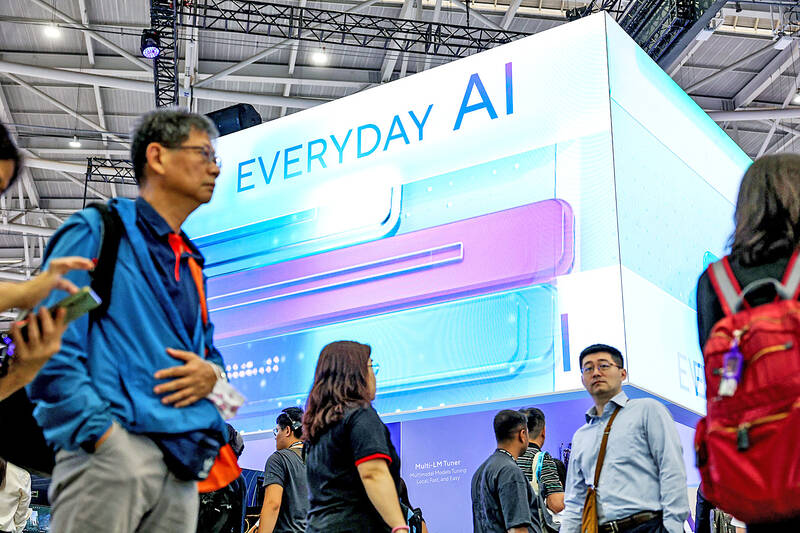The industrial production index rose 22.6 percent year-on-year to 120.18 last month, driven by strong demand for artificial intelligence (AI) servers and related applications, as well as continued front-loading of shipments in anticipation of potential US tariffs, the Ministry of Economic Affairs reported yesterday.
The manufacturing production index, which comprises 94.63 percent of the industrial production index, increased 24 percent year-on-year to 121.41, marking the 15th consecutive month of growth and surpassing the ministry’s forecast range of 108.67 to 112.67.
In the first five months of this year, the industrial and manufacturing production indices grew by 16.39 and 17.43 percent year-on-year respectively, Department of Statistics Deputy Director-General Huang Wei-jie (黃偉傑) told a news conference in Taipei.

Photo: AFP
The manufacturing production index this month is expected to rise between 23.6 and 27.8 percent annually, the ministry said.
That could push the industrial production index for the first half of the year to between 106.96 and 107.63, a year-on-year increase of 18.5 to 19.2 percent — the highest growth for the same period since 2010, Huang said.
“Before the tariff rate is finalized, there will be a front-loading effect, but it will gradually taper off, as manufacturers cannot continue to front-load indefinitely,” he said.
“The recent growth momentum in the indices is mainly driven by the AI sector,” he said.
Production of electronic components rose 34.53 percent year-on-year as demand for high-performance computing (HPC) and AI applications remained strong, the ministry said.
The sub-index for semiconductor production surged 38.1 percent, driven by continued strong demand for AI and HPC devices, which boosted demand for 12-inch wafers.
Meanwhile, the sub-index for flat panel and related component production rose 5.09 percent, ending a decline that had persisted since April, it said
“As front-loading shipments of large TV panels ended in the first quarter, it might now be the turn for medium and small panels, which are mainly used in industrial, automotive and medical applications,” Huang said.
Production of computers, electronic goods and optical components surged 89.28 percent year-on-year, driven by strong demand for AI applications and cloud data services, while ongoing investment in the semiconductor industry also boosted output of servers and information technology products, the ministry said.
In contrast, production of base metals, primarily steel, fell 6.3 percent annually, attributed to manufacturers suspending operations for maintenance and repair of production equipment since April, with some manufacturers indicating that repairs would take more than a month, Huang said.
Machinery equipment production rose 6.21 percent year-on-year, driven by demand for semiconductor production equipment, such as chip packaging and testing, as some manufacturers continue to expand their plants, he said.
However, production of chemical materials and fertilizers fell 8.51 percent, mainly due to price competition from Chinese rivals and weak market demand, he added.
Car product output declined 16.31 percent, as some production lines were temporarily shut down for maintenance, which reduced output of small sedans and trucks, he said.
The front-loading momentum for car components also slowed compared with the previous month, he added.

NOT JUSTIFIED: The bank’s governor said there would only be a rate cut if inflation falls below 1.5% and economic conditions deteriorate, which have not been detected The central bank yesterday kept its key interest rates unchanged for a fifth consecutive quarter, aligning with market expectations, while slightly lowering its inflation outlook amid signs of cooling price pressures. The move came after the US Federal Reserve held rates steady overnight, despite pressure from US President Donald Trump to cut borrowing costs. Central bank board members unanimously voted to maintain the discount rate at 2 percent, the secured loan rate at 2.375 percent and the overnight lending rate at 4.25 percent. “We consider the policy decision appropriate, although it suggests tightening leaning after factoring in slackening inflation and stable GDP growth,”

DIVIDED VIEWS: Although the Fed agreed on holding rates steady, some officials see no rate cuts for this year, while 10 policymakers foresee two or more cuts There are a lot of unknowns about the outlook for the economy and interest rates, but US Federal Reserve Chair Jerome Powell signaled at least one thing seems certain: Higher prices are coming. Fed policymakers voted unanimously to hold interest rates steady at a range of 4.25 percent to 4.50 percent for a fourth straight meeting on Wednesday, as they await clarity on whether tariffs would leave a one-time or more lasting mark on inflation. Powell said it is still unclear how much of the bill would fall on the shoulders of consumers, but he expects to learn more about tariffs

Greek tourism student Katerina quit within a month of starting work at a five-star hotel in Halkidiki, one of the country’s top destinations, because she said conditions were so dire. Beyond the bad pay, the 22-year-old said that her working and living conditions were “miserable and unacceptable.” Millions holiday in Greece every year, but its vital tourism industry is finding it harder and harder to recruit Greeks to look after them. “I was asked to work in any department of the hotel where there was a need, from service to cleaning,” said Katerina, a tourism and marketing student, who would

i Gasoline and diesel prices at fuel stations are this week to rise NT$0.1 per liter, as tensions in the Middle East pushed crude oil prices higher last week, CPC Corp, Taiwan (台灣中油) and Formosa Petrochemical Corp (台塑石化) said yesterday. International crude oil prices last week rose for the third consecutive week due to an escalating conflict between Israel and Iran, as the market is concerned that the situation in the Middle East might affect crude oil supply, CPC and Formosa said in separate statements. Front-month Brent crude oil futures — the international oil benchmark — rose 3.75 percent to settle at US$77.01